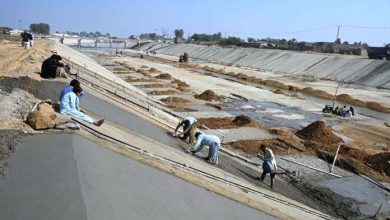Water Stress Among Top 10 Risks Identified as Biggest Threats to Pakistan: Report
n water scarcity in Pakistan, Global Risks Report 2023 brings insights to guide decision makers, political leaders, risk experts, policymakers and industry leaders.
- Water infrastructure could continue to be used both as a weapon: Global Risks Report 2023
- Water stress among top 10 risks identified as biggest threats to Pakistan
- Water scarcity, combined with paralysis of international cooperation mechanisms, has necessitated a degree of water nationalism
- On water scarcity in Pakistan, Global Risks Report 2023 brings insights to guide decision makers, political leaders, risk experts, policymakers and industry leaders.
Islamabad: Amid the current humanitarian crises and state instability, water infrastructure could continue to be used both as a weapon and target, mirroring past water conflicts and terrorism in India, Pakistan, and Afghanistan, says the Global Risks Report 2023.
The report is produced in partnership with Marsh McLennan and Zurich Insurance Group and draws on the views of over 1,200 global risk experts, policymakers and industry leaders.
Water scarcity Impacts Women
Highlighting the climate-induced vulnerabilities of Pakistan, the report states that water stress is also widespread in Pakistan that particularly impacts women and girls responsible for water collection, with knock-on impacts on health and education outcomes.
Water scarcity Impacts farmland
The report further warns “some 800,000 hectares of farmland have been wiped out by 2022 floods in Pakistan – this has resulted in increasing commodity prices significantly in a country that is already grappling with record 27% inflation”.
Water scarcity could reignite water nationalism
More widespread water scarcity, combined with paralysis of international cooperation mechanisms, has necessitated a degree of water nationalism, resulting in prolonged disputes between neighbouring states and countries, it adds.
Extreme weather, Water scarcity, and food shortages
Regarding water, food, and environmental risks for Pakistan, the Global Risk Report warns that a combination of extreme weather events and constrained supply could lead the current cost-of-living crisis into a catastrophic scenario of hunger and distress for millions. Also, the report further warns of fatalities if combined with seasonal extreme weather.
Terrestrial biodiversity loss and ecosystem collapse
Besides water, terrestrial biodiversity loss and ecosystem collapse is identified as the 8th risk among the top ten risks listed in The Global Risk Report 2023.
The report suggests that these crises could undermine efforts to tackle longer-term risks, those related to climate change, biodiversity and investment in human capital.
Water scarcity in Pakistan could exacerbate instability, food shortages
Amir Jahangir, Chief Executive Officer Mishal Pakistan, the Partners Institute for New Economy and Societies Platforms of the World Economic Forum, said “The impact of insecurity will continue to be felt in Pakistan and may also exacerbate instability due to simultaneous food and debt crises, resulting in the emergence of a possible more technocracy-based decision-making leadership framework.”
Green investments
On the climate change risks, the report identifies that the cost-of-living crisis is the biggest short-term risk while the failure of climate mitigation and climate adaptation is the largest long-term concern.
Climate and human development therefore must be at the core of concerns of global leaders to boost resilience against future shocks,” said Saadia Zahidi, WEF Managing Director.
Joint efforts to mitigates climate risks
The report urges the global leadership to act collectively and decisively, balancing short- and long-term views, and calls for coordinated climate action, and recommends joint efforts to mitigates these risks.
Unless the world starts to cooperate more effectively on climate mitigation and climate adaptation, over the next 10 years this will lead to continued global warming and ecological breakdown.
Saving the deteriorating biodiversity
More alarming, the failure to mitigate and adapt to climate change, natural disasters, biodiversity loss and environmental degradation represent five of the top 10 risks – with biodiversity loss seen as one of the most rapidly deteriorating global risks over the next decade.
If solid actions are not taken, vulnerable countries like Pakistan could reach a perpetual state of crisis where they are unable to invest in future growth, human development, and green technologies.
The report conclude that present and future risks can compound impacts and disastrous consequences, adding that “Resource Rivalries”, for natural resources, including food, water, and energy could further aggravate the existing societal distress.
The Global Risks Report is a pillar of the Forum’s Global Risks Initiative which works to promote a greater common understanding of short, mid-and long-term global risks to enable learning on risk preparedness and resilience.
By: M.A
Email: VOW2025@Gmail.com







